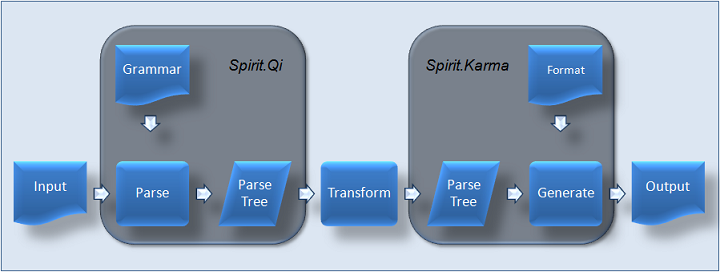#include <iostream>
#include <stdexcept>
#include <string>
#include <vector>
#include <boost/spirit/home/x3.hpp>
#include <boost/range/adaptor/indexed.hpp>
/* An example of CSV:
* kind,of,header
* abc,with space,"quote"
* "comma , inside",132, spaces dot
*
* CSV (comma separated value) EBNF appr. specification (http://www.rfc-editor.org/rfc/rfc4180.txt)
* string := [^,\n]+
* qstring := " [^"]* "
* cell := qstring | string
* row := cell (, cell)* \n
* csv := row+
*/
namespace types::csv
{
using csv = std::vector<std::vector<std::string>>;
}
namespace parser::csv
{
namespace x3 = boost::spirit::x3;
const auto string = x3::lexeme[+~x3::char_(",\n")];
const auto qstring = x3::lexeme['"' >> *(('\\' >> x3::char_) | ~x3::char_("\"")) >> '"'];
const auto cell = qstring | string;
const auto row = x3::rule<class row, std::vector<std::string>>{}
= (cell % ',') >> x3::no_skip[x3::eol];
const auto csv = x3::rule<class csv, types::csv::csv>{}
= +row;
template<class Container>
auto parse(const Container& cnt)
{
types::csv::csv result;
auto it = cnt.begin();
if (!x3::phrase_parse(it, cnt.end(), csv, x3::ascii::space, result))
throw std::runtime_error("Invalid input data");
if (it != cnt.end())
throw std::out_of_range("Parsing is not complete");
return result;
}
}
int main()
{
std::string csv_data = R"(
kind,of,header
abc,with space,"quote"
"comma , inside",132, spaces dot
new text, quote \"escaped, " similar\" "
empty,"",""
)";
auto result = parser::csv::parse(csv_data);
for (const auto& row : result | boost::adaptors::indexed())
{
std::cout << "Row #" << row.index() << ":";
for (const auto& cell : row.value() | boost::adaptors::indexed())
std::cout << " F#" << cell.index() << ": [" << cell.value() << "]";
std::cout << "\n";
}
} 
